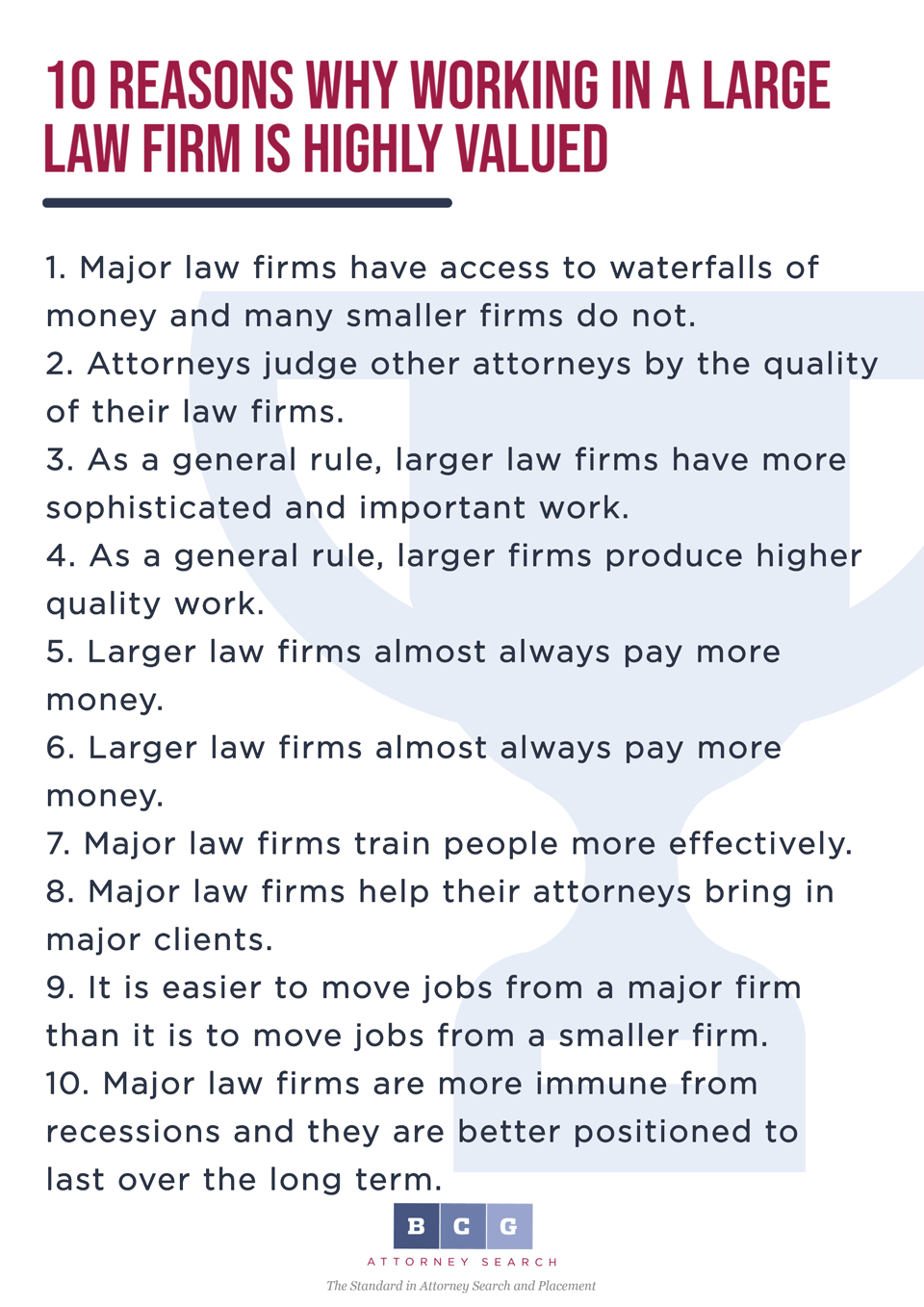- There are many good reasons lawyers should work at major Law firms.
- Major law firms are more financially liquid than smaller firms.
- Lawyers within major law firms are judged higher by other lawyers.
- This is especially true for lawyers who are migrating laterally to new firms.
- Keep reading for more reasons lawyers should work at major law firms.
Summary: Learn the 10 reasons it is extremely important for attorneys to work in major law firms.

In the DNA of most attorneys is a motivation to work in the largest and most prestigious law firms. If I were to phone a representative sample of attorneys and tell them that a major law firm much more prestigious than their current firm was interested in them, most would jump at the chance to join the more prestigious firm. Not all attorneys would, but the majority would. As I discuss in this article, and without placing a value judgment on those who either cannot or choose not to work in such firms, there are several reasons that make it extremely important for attorneys to work in major law firms.

While I hate to be the messenger, here are the reasons why working in a large law firm is so highly valued:
- Major Law Firms Have Access to Waterfalls of Money and Many Smaller Firms Do Not
While there are many reasons that major law firms are better than smaller ones, the reason I believe is most important is that major law firms have access to waterfalls of money. Clients with money to pay high large firm billing rates are lining up to have their matters worked on and staffed by large firm attorneys. There is more work to be done inside of the largest and most successful law firms—often more work than the firms even have time to take on. This healthy amount of work results in “waterfalls of money” that supports the entire system. It allows the law firms to have lavish summer associate programs, multiple practice areas, huge average profits-per-partner, huge associate salaries, giant support departments of legal secretaries, paralegals, and others, and the opportunity to pursue even larger clients for even more substantial work. For an up-to-date comparison of partner pay in major versus smaller firms, consult our Law Firm Partner Compensation Report (2026).

|
| Harrison Barnes |
In contrast, smaller law firms have fee-sensitive clients and lack waterfalls of money coming into them. They need to be careful how much they pay associates, rarely have summer associate programs, cannot pay high profits per partner, and cannot staff up large matters. Important, large clients have no interest in these firms and everything else suffers. Without waterfalls of money pouring in, attorneys have fewer opportunities, which limits the potential of everyone there. Small firm attorneys are limited regarding their earning potential, quality of clientele, recruiting base, and everything else.
Because we are in a capitalist society, money is very important. To grow, law firms need access to waterfalls of money and clients to send large checks each month.
See the following articles for more information:
- The Top Reasons Why Money Is the Dumbest Thing Any Attorney Should Focus on When Joining a Law Firm
- Why You Should Find Your “Tribe” and Not Just Focus on Money in Making Law Firm Job Decisions
- How to Make a Lot of Money Practicing Law
- Attorneys Judge Other Attorneys by the Quality of Their Law Firms
The entire legal profession continually ranks, classifies, and partitions attorneys into boxes. The legal profession is interested in your school, your practice area, who you worked with, your history, and all sorts of other things. Within your firm, there will be snobbery based on who you are close to, your practice area, who gives you work, who you give work to, and more.
However, the presumed “quality” of an attorney’s peers (the quality of an attorney’s law firm) is the most important box and indicia by which an attorney will be measured by other attorneys. The first two questions any attorney has about any other attorney are (1) where the attorney works and (2) what the attorney’s title is. Attorneys working at smaller or poorer law firms get placed in less prestigious and enviable boxes. Everything the attorney may have done up until that point in his or her life will be discounted and the attorney will simply be labeled a “small firm attorney” or “an attorney working at a regional firm” or something along those lines. For attorneys questioning whether striving for a top firm is essential, our video Why You Might be Better Off Being an Average Attorney Than Trying to Be an Exceptional One offers a practical viewpoint.
Regarding how attorneys judge each other, there is nothing more important than the quality of the attorney’s law firm. The quality of the law firm is more important than
- the quality of the attorney’s law school,
- how well the attorney did in that law school,
- the attorney’s practice area, and
- the attorney’s social class, race, ethnicity, or sexual orientation.
The most important qualification for how an attorney judges another attorney is the quality of the attorney’s law firm. The presumption is that if an outstanding group of peers has accepted you to be one of its members, you too must be outstanding.
In the realm of legal recruiting and placement, nothing is more important than the quality of the law firm. Even if a candidate went to a fourth-tier law school, good law firms will ignore this negative (within reason) if the candidate is coming from a prestigious major law firm. No one cares for the most part about anything else besides the quality of the attorney’s law firm. If the attorney is considered part of an “elite” peer group, then the attorney is considered elite. Attorneys will be more respected by courts, corporations, and everyone else if they are with major law firms. They will be considered smarter, more driven, and more professional if they are with major law firms. If you care what other attorneys think of you, you should be at a major law firm.
See the following articles for more information:
- 10 Factors That Matter to Big Firms More Than Where You Went to Law School: Why the Law School You Went to Ultimately Does Not Matter as Much as You Think It Does to Major Law Firms
- Top 10 Ways Attorneys Can Move to a Better Law Firm and Get a Better Attorney Job
- As a General Rule, Larger Law Firms Have More Sophisticated and Important Work
- If an attorney is working on more sophisticated matters, there are all sorts of benefits that flow out of this: (1) there is more money to go around, (2) more attorneys are needed, (3) only the best attorneys staff the case, and (4) the matter is more important to business and society.
- In contrast, the smaller the law firm: (1) the less likely there is to be a lot of money to go around, (2) the fewer attorneys are used, (3) the less there will be a need for good attorneys, and (4) the less likely the matter is to be important to business and society.
Attorneys are competitive with one another and are constantly judging each other. The attorneys with the most motivation tend to seek out the most sophisticated work by moving to major American legal markets like New York, Los Angeles, Chicago, and the Bay Area. In these markets, you will find most of the largest law firms and a preponderance of top law school graduates competing for jobs. The most sophisticated work is in the largest markets. Many attorneys would never consider working in any market where they could not be working on the most sophisticated matters.
See the following articles for more information:
- Which Type of Law Firm Is Best for You and Your Career: Main Offices of Large National Firms, Branch Offices of Large National Firms, Midsized Firms, Boutiques, or Newer Fast-Growing Firms?
- Choosing the Small versus the Large Firm
- Does (Firm) Size Really Matter?
- As a General Rule, Larger Firms Produce Higher Quality Work
Regardless of the intelligence of an attorney, an attorney associated with a major law firm as opposed to a smaller law firm is almost always more likely to do better work. Major law firms do better quality work than smaller law firms because they have (1) more resources (people and support), (2) more money to throw at problems, and (3) better people doing the work.
Larger law firms do better work because they typically have more levels of people working on problems. They will have people to research problems and people to work on problems higher up the chain. The law firm will have an institutional set of checks and balances and internal competitions that encourage the best quality work. Also, unlike smaller law firms, larger law firm clients have much larger budgets and are willing to pay for the best possible work to be done. Large law firms generally do work that is more thorough and analyzed than smaller law firms. Finally, surrounded by other intelligent and motivated people, the collaborative effect of problem-solving and work quality in larger law firms is often clearly distinguishable from that of smaller firms.
Attorneys who produce better quality work command more respect by other attorneys and the market.
See the following articles for more information:
- You Must Produce and Do Quality Work
- The Importance of High Standards in Your Life and Career: What High Standards Mean
- Larger Law Firms Almost Always Pay More Money
While money may not be your driving force, you are much more likely to make far more money working in a major law firm than in a smaller one because—as discussed above—large law firms have access to “waterfalls of money.” More money means you can save more, live better, support your family better, and do and buy more of whatever else is important to you. And, because we are living in a capitalist society where people judge each other based on wealth, this is a concern to many attorneys as well. Many attorneys are obsessed with how much money they make and are constantly seeking to make more. If compensation is your driving factor, there is much more to be made in major law firms than smaller ones.
- See Never Focus on the Money: Focus on Your Higher Purpose and Contribution for more information.
- It Is More Difficult to Get a Job with a Major Law Firm
Large law firms are more selective and considered more prestigious than smaller law firms. In general, it is more difficult for most attorneys to get a job with the most prestigious law firms than get into most top law schools. A prestigious law firm says something about your charisma, motivation, and ability to get other motivated people to accept you and want to work with you.
Because major law firms are so difficult to get positions with, other attorneys (and the market) respect attorneys coming from these firms more than they do attorneys coming from smaller, unknown firms. The presumption (while not necessarily true) is that larger law firm attorneys are better than smaller law firm attorneys.
See the following articles for more information:
- 21 Reasons You Will Never Get a Job with a Major Law Firm Now (or Ever Again)
- 6 Things Attorneys and Law Students Need to Remove from Their Resumes ASAP If They Want to Get Jobs with the Most Prestigious Law Firms
- Why Law Firms Reject You
- Major Law Firms Train People More Effectively
Major law firms typically have higher standards for what makes a good piece of work than smaller law firms. Attorneys typically receive much better training at major law firms than they do at smaller law firms. In fact, the training and quality controls tend to make large law firm attorneys much more effective in every practice area. Large law firm clients have more money to spend to make sure that the work product is as good as possible. Because of this, larger law firms expect higher quality work. Companies and other law firms know the sort of quality they are getting when they hire a large law firm attorney, but it can be all over the map with smaller law firm attorneys. It is for this reason that major law firms prefer hiring from other major law firms.
See the following articles for more information:
- The 9 Most Important Characteristics of the Best Law Firm Training Programs
- Guide to Law Firm Associate Hiring, Training, and Promotion
- Major Law Firms Help Their Attorneys Bring in Major Clients
Most major clients with “waterfalls of money” to spend on legal issues are not interested in hiring small law firms. Why would they be? They want to hire the biggest and most respected firms in most instances because that shows their strength. In contrast, smaller companies are more likely to hire the sorts of attorneys they can afford, or they may not even understand the legal pecking order.
While it is not always the case, to make a great deal of money in the legal profession and have the most respect among your fellow attorneys, you need to have the biggest clients. The attorneys who are the most successful and respected in the market typically represent the largest clients. The largest clients hire attorneys based on the quality and reputation of their firms and the perception that such firms can get the work done.
- See Top 9 Ways for Any Attorney to Generate a Ton of Business for more information.
- It Is Easier to Move Jobs from a Major Firm Than It Is to Move Jobs from a Smaller Firm
One benefit of working for larger law firms is that you can move between them without too much difficulty. You can also more easily move to a smaller law firm if you do not like your larger law firm. The smaller law firm will be much happier to have you than if you were coming from another small law firm. Also, it is much easier to move in-house if you are at a major law firm. Large companies want to hire as in-house counsel the same quality of attorneys that they would hire to work for them as their outside attorneys.
You are almost always much more employable if you are coming from a major law firm as opposed to a smaller one.
See the following articles for more information:
- The Right and Wrong Reasons to Switch Law Firms
- The 'Dark Side' of Going In-house
- Why Going In-house Is Often the Worst Decision a Good Attorney Can Ever Make
- How Can I Move from a Small Boutique Firm to a Big Law Firm?
- As a Mid-level Associate in a Big Firm, Should I Move to a Smaller Firm to Become a Partner?
- Major Law Firms Are More Immune from Recessions and They Are Better Positioned to Last Over the Long Term
Major law firms can last centuries as business enterprises. A major reason for this is that they have access to “waterfalls of money” coming from multiple locations. Most major law firms are kept in business not only because of their names but because they have multiple practice areas and do several different things. They may do real estate, corporate, lobbying, intellectual property, and litigation. This variety of practice areas keeps them going through recessions because it can be countercyclical. Also, major law firms have offices in multiple cities. Geographic diversity helps large law firms survive when certain geographic areas are doing better than others. Finally, large law firms work for many different clients in many different industries. This diversification also helps them to survive. Small and midsized firms have a much more difficult time competing due to this and are more likely to experience financial issues than smaller ones.
See the following articles for more information:
Conclusions
The desire to work for a major law firm is not much different than the desire that has plagued people forever: The desire for more money, more power, and to be surrounded by the most motivated and successful people. The insatiable desire that many attorneys have to work in a major law firm is similar to the desire many people have to live in a major city. Just as there is nothing wrong with living in a small town, there is nothing inherently wrong with working in a small law firm, unless you have the big firm mindset. It is this mindset that drives everything and permeates the legal profession.
There are people in small towns who want much more. They know that there is only so much they can accomplish in a small town and this makes them feel limited. They want more and they do not want to be assigned the label of being from a small town. They want the opportunity to accomplish everything they possibly could on a more major stage. Larger towns have more diversity, are more tolerant, and offer people more long-term potential for accomplishments. The best jobs, best social groups, and best work opportunities are almost always in major cities. It is this drive for access to all these benefits that sends people from smaller towns to large cities and many people to this country. It is also this drive that makes most attorneys interested in working for the largest and most prestigious law firms. In fact, without the drive to go from something less significant to something more significant, large law firms would likely not be in business.
The allure of the larger law firm, though, is that it perpetuates the need for more—to prove yourself, to never be content, and to never be satisfied with who you are. All the things that attorneys have set up to judge and categorize one another play on your insecurities and need to be better and better. The need to always be striving for more is something that can drive many attorneys crazy and make them very unhappy. Despite all of the advantages of practicing law with a major law firm, attorneys tend to have the most long-term happiness and success when they practice law outside of major cities and in smaller law firms where they are not so conscious of what they lack. Very few small town and small law firm attorneys are as unhappy as large law firm attorneys caught up in the never-ending popularity contest necessary to stay employed and succeed with the largest law firms.
About Harrison Barnes
No legal recruiter in the United States has placed more attorneys at top law firms across every practice area than Harrison Barnes. His unmatched expertise, industry connections, and proven placement strategies have made him the most influential legal career advisor for attorneys seeking success in Big Law, elite boutiques, mid-sized firms, small firms, firms in the largest and smallest markets, and in over 350 separate practice areas.
A Reach Unlike Any Other Legal Recruiter
Most legal recruiters focus only on placing attorneys in large markets or specific practice areas, but Harrison places attorneys at all levels, in all practice areas, and in all locations-from the most prestigious firms in New York, Los Angeles, and Washington, D.C., to small and mid-sized firms in rural markets. Every week, he successfully places attorneys not only in high-demand practice areas like corporate and litigation but also in niche and less commonly recruited areas such as:
- Immigration Law
- Workers Compensation
- Insurance
- Family Law
- Trust and Estate
- Municipal law
- And many more...
This breadth of placements is unheard of in the legal recruiting industry and is a testament to his extraordinary ability to connect attorneys with the right firms, regardless of market size or practice area.
Proven Success at All Levels
With over 25 years of experience, Harrison has successfully placed attorneys at over 1,000 law firms, including:
- Top Am Law 100 firms such including Sullivan and Cromwell, and almost every AmLaw 100 and AmLaw 200 law firm.
- Elite boutique firms with specialized practices
- Mid-sized firms looking to expand their practice areas
- Growing firms in small and rural markets
He has also placed hundreds of law firm partners and has worked on firm and practice area mergers, helping law firms strategically grow their teams.
Unmatched Commitment to Attorney Success - The Story of BCG Attorney Search
Harrison Barnes is not just the most effective legal recruiter in the country, he is also the founder of BCG Attorney Search, a recruiting powerhouse that has helped thousands of attorneys transform their careers. His vision for BCG goes beyond just job placement; it is built on a mission to provide attorneys with opportunities they would never have access to otherwise. Unlike traditional recruiting firms, BCG Attorney Search operates as a career partner, not just a placement service. The firm's unparalleled resources, including a team of over 150 employees, enable it to offer customized job searches, direct outreach to firms, and market intelligence that no other legal recruiting service provides. Attorneys working with Harrison and BCG gain access to hidden opportunities, real-time insights on firm hiring trends, and guidance from a team that truly understands the legal market. You can read more about how BCG Attorney Search revolutionizes legal recruiting here: The Story of BCG Attorney Search and What We Do for You.
The Most Trusted Career Advisor for Attorneys
Harrison's legal career insights are the most widely followed in the profession.
- His articles on BCG Search alone are read by over 150,000 attorneys per month, making his guidance the most sought-after in the legal field. Read his latest insights here.
- He has conducted hundreds of hours of career development webinars, available here: Harrison Barnes Webinar Replays.
- His placement success is unmatched-see examples here: Harrison Barnes' Attorney Placements.
- He has created numerous comprehensive career development courses, including BigLaw Breakthrough, designed to help attorneys land positions at elite law firms.
Submit Your Resume to Work with Harrison Barnes
If you are serious about advancing your legal career and want access to the most sought-after law firm opportunities, Harrison Barnes is the most powerful recruiter to have on your side.
Submit your resume today to start working with him: Submit Resume Here
With an unmatched track record of success, a vast team of over 150 dedicated employees, and a reach into every market and practice area, Harrison Barnes is the recruiter who makes career transformations happen and has the talent and resources behind him to make this happen.
A Relentless Commitment to Attorney Success
Unlike most recruiters who work with only a narrow subset of attorneys, Harrison Barnes works with lawyers at all stages of their careers, from junior associates to senior partners, in every practice area imaginable. His placements are not limited to only those with "elite" credentials-he has helped thousands of attorneys, including those who thought it was impossible to move firms, find their next great opportunity.
Harrison's work is backed by a team of over 150 professionals who work around the clock to uncover hidden job opportunities at law firms across the country. His team:
- Finds and creates job openings that aren't publicly listed, giving attorneys access to exclusive opportunities.
- Works closely with candidates to ensure their resumes and applications stand out.
- Provides ongoing guidance and career coaching to help attorneys navigate interviews, negotiations, and transitions successfully.
This level of dedicated support is unmatched in the legal recruiting industry.
A Legal Recruiter Who Changes Lives
Harrison believes that every attorney-no matter their background, law school, or previous experience-has the potential to find success in the right law firm environment. Many attorneys come to him feeling stuck in their careers, underpaid, or unsure of their next steps. Through his unique ability to identify the right opportunities, he helps attorneys transform their careers in ways they never thought possible.
He has worked with:
- Attorneys making below-market salaries who went on to double or triple their earnings at new firms.
- Senior attorneys who believed they were "too experienced" to make a move and found better roles with firms eager for their expertise.
- Attorneys in small or remote markets who assumed they had no options-only to be placed at strong firms they never knew existed.
- Partners looking for a better platform or more autonomy who successfully transitioned to firms where they could grow their practice.
For attorneys who think their options are limited, Harrison Barnes has proven time and time again that opportunities exist-often in places they never expected.
Submit Your Resume Today - Start Your Career Transformation
If you want to explore new career opportunities, Harrison Barnes and BCG Attorney Search are your best resources. Whether you are looking for a BigLaw position, a boutique firm, or a move to a better work environment, Harrison's expertise will help you take control of your future.
Submit Your Resume Here to get started with Harrison Barnes today.
Harrison's reach, experience, and proven results make him the best legal recruiter in the industry. Don't settle for an average recruiter-work with the one who has changed the careers of thousands of attorneys and can do the same for you.
About BCG Attorney Search
BCG Attorney Search matches attorneys and law firms with unparalleled expertise and drive, while achieving results. Known globally for its success in locating and placing attorneys in law firms of all sizes, BCG Attorney Search has placed thousands of attorneys in law firms in thousands of different law firms around the country. Unlike other legal placement firms, BCG Attorney Search brings massive resources of over 150 employees to its placement efforts locating positions and opportunities its competitors simply cannot. Every legal recruiter at BCG Attorney Search is a former successful attorney who attended a top law school, worked in top law firms and brought massive drive and commitment to their work. BCG Attorney Search legal recruiters take your legal career seriously and understand attorneys. For more information, please visit www.BCGSearch.com.
Harrison Barnes does a weekly free webinar with live Q&A for attorneys and law students each Wednesday at 10:00 am PST. You can attend anonymously and ask questions about your career, this article, or any other legal career-related topics. You can sign up for the weekly webinar here: Register on Zoom
Harrison also does a weekly free webinar with live Q&A for law firms, companies, and others who hire attorneys each Wednesday at 10:00 am PST. You can sign up for the weekly webinar here: Register on Zoom
You can browse a list of past webinars here: Webinar Replays
You can also listen to Harrison Barnes Podcasts here: Attorney Career Advice Podcasts
You can also read Harrison Barnes' articles and books here: Harrison's Perspectives
Harrison Barnes is the legal profession's mentor and may be the only person in your legal career who will tell you why you are not reaching your full potential and what you really need to do to grow as an attorney--regardless of how much it hurts. If you prefer truth to stagnation, growth to comfort, and actionable ideas instead of fluffy concepts, you and Harrison will get along just fine. If, however, you want to stay where you are, talk about your past successes, and feel comfortable, Harrison is not for you.
Truly great mentors are like parents, doctors, therapists, spiritual figures, and others because in order to help you they need to expose you to pain and expose your weaknesses. But suppose you act on the advice and pain created by a mentor. In that case, you will become better: a better attorney, better employees, a better boss, know where you are going, and appreciate where you have been--you will hopefully also become a happier and better person. As you learn from Harrison, he hopes he will become your mentor.
To read more career and life advice articles visit Harrison's personal blog.






